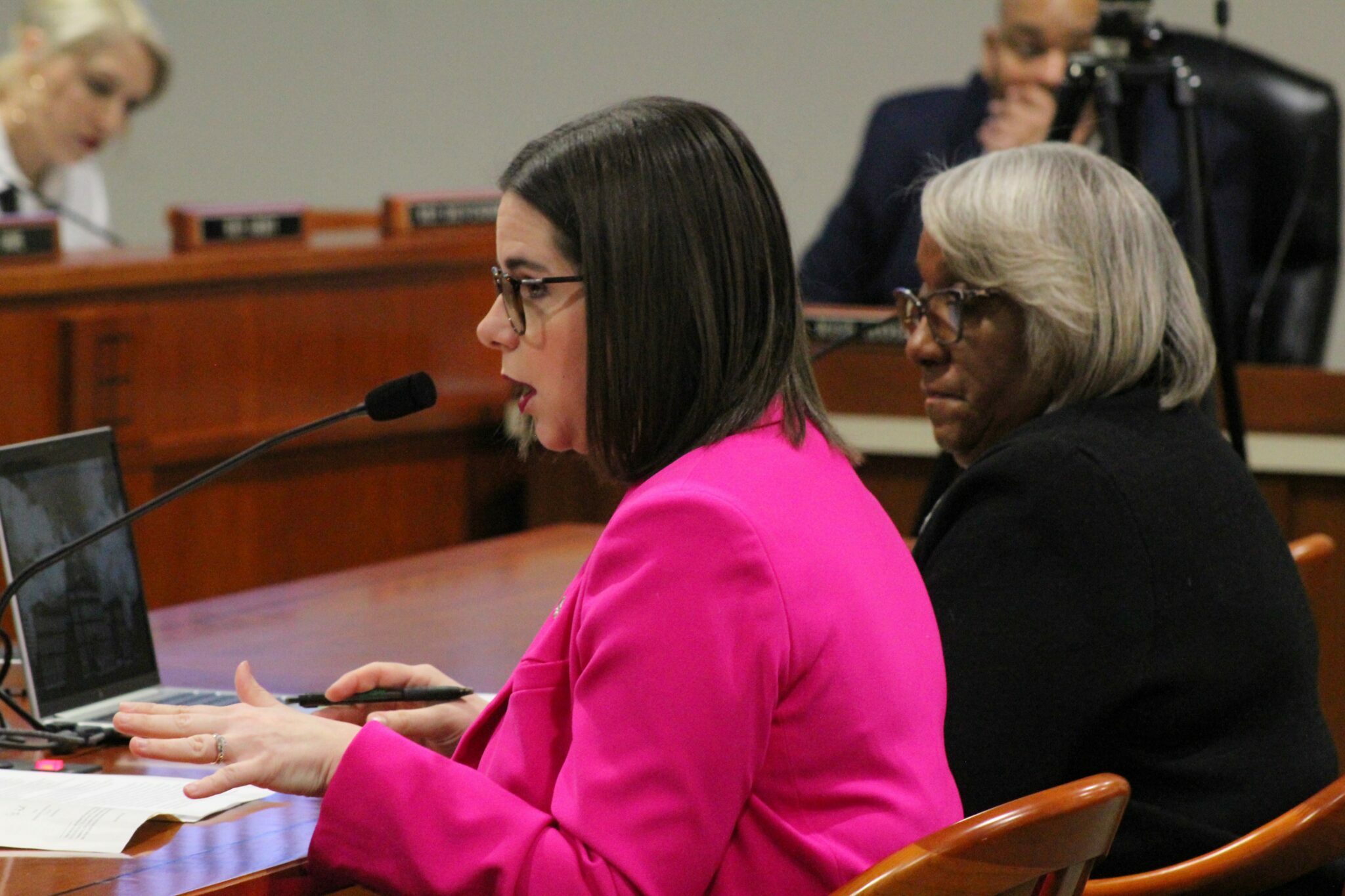House Panel Considers Bills Making It Easier for Transgender Michiganders to Change Their Names

Members of the LGBTQ+ community and allies spoke about the additional costs and indignities a person goes through to change their name in Michigan during hearing on Feb. 7 in the Michigan House Judiciary Committee.
The legislation on the table for the committee would remove some of the requirements placed on Michiganders when they change their name outside of marriage, as well as make it easier for a person to select the sex marker they feel is appropriate for them on their birth certificate and driver’s license.
“The laws have not always been good to my community or myself,” transgender advocate Lilianna-Angel Reyes told committee members.
As the executive director of the Trans Sistas of Color Project and health equity and outreach director of the Ruth Ellis Center in Detroit, Reyes said she has worked to provide resources to transgender Michiganders ages 14 to 80 across several counties. When some of those individuals required a lawyer in order to get their identifying documents changed, Reyes said it has cost between $1,000 and $3,000 to hire one.
When a recently married individual wants to change any element of their name on their driver’s license or state ID, all they have to do is obtain a certified copy of their marriage certificate, alert the Social Security office to receive a new Social Security card and take the required identifying documents to their local Secretary of State branch office in order to receive a new driver’s license or state ID with the new name. The process typically costs under $50.
However, a person seeking a name change for any other reason has to go to court in Michigan.
The person must file a petition for a name change in the appropriate local court in a county they have been a resident in for more than a year, which costs around $175 to file. This is only the first step in what advocates for the proposed legislation call a broken system that benefits no one and hurts many.
Emme Zanotti, director of advocacy and civic engagement at Equality Michigan, called attention to the requirement in the petition to put in writing a “purpose showing a sufficient reason for the proposed change and that the change is not sought with a fraudulent intent.”
“When you presume fraudulent intent or guilt unless we can prove otherwise, that’s not how I learned our justice system to be,” Zanotti said. “Those aren’t just laws. I know that.”
If a person has any criminal record, there is an automatic presumption of guilt of attempting fraud if they petition for a name change. Petitioners bear the burden of proof in court to rebut that presumption, which often requires the help of hiring legal representation.
Petitioners for a name change who are 22 years old and older are required to have two complete sets of their fingerprints taken at their local police station, costing about $40. Required materials, including the fingerprints are reviewed by the state police department and then the Federal Bureau of Investigation.
Then, petitioners for a name change have to publish notice of the court proceeding to change their name in a news outlet determined by the court for about $100 generally, noting the person’s current name, the name their petitioning for, and information about the proceeding in case a person wishes to contest the person’s name change.

A name change cost Mikah Rector-Brooks, who is transgender, $500 and took three months in a “discriminatory” process.
“Essentially, I had to out myself in my local newspaper, putting my name, my chosen name, and where I was having a court hearing so that anyone who disagreed with my want and wish to live by a name that I identify as could go to the court and confront the judge about it,” Rector-Brooks said.
There is no evidence that the current system for name changes prevents the fraud it assumes of individuals, bill sponsor state Rep. Laurie Pohutsky (D-Livonia) said. To the contrary, current rules are “outdated” and “unfair” to anyone seeking a name change outside of marriage or divorce.
“To change the name outside of those events is complicated, expensive and confusing to the extent that it is sometimes prohibitive for people to do so,” Pohutsky said. “There are many reasons why someone might want to change their name outside of those two events, not limited to desiring to align your name with your gender identity or fleeing a domestic abuse or human trafficking [situation].”
HB 5300 would allow a judge to bypass having a hearing to approve a name change if appropriate. If the judge requires a hearing, but the person seeking a name change has shown good cause that publication of the hearing could cause them harm, the judge is required to to not order publication.
HB 5300 would also eliminate the automatic presumption of fraud for those petitioning for a name change that have a criminal record. Fingerprinting would also be eliminated.
Reyes, who had to go through transitioning alone at 17, said she now has helped 500 individuals in metro Detroit to change their names or gender markers, some of whom were kicked out of their homes as young teens and experienced homelessness.
“Those gender marker and name changes allowed them to break away from their past traumas and live authentically and get jobs and be the people they want to be,” Reyes said. “We’ve seen what happens when people are allowed to change their name and gender marker. I changed my name at the age of 19, got a master’s degree from the University of Michigan and I am now helping … people.”
Rep. Gina Johnsen (R-Odessa Twp.) had questions, including asking whether a person can “really change their biological sex.
“Where does it stop? Because let’s say I want to be six inches taller, I can’t really change that,” Johnson said.
Rhetoric against gender affirming care and the LGBTQ community has been fairly prevalent from Michigan’s Republican elected officials, even when talking about topics that are not related, like child marriage.
Recently a group of Republican lawmakers held a forum on social media led by Rep. Brad Paquette (R-Niles) to discuss ideas to ban trans health care. Paquette has introduced two bills this session to make it a four-year felony to provide “drugs or surgery to a minor for gender transition.”
About 78% of transgender adults in Michigan don’t have an ID that lists the correct gender for them, the highest percentage of any state, according to the Williams Institute in the University of California Los Angeles School Of Law.
The bills the committee will review and potentially send to the House floor for a vote could offer some dignity to trans Michiganders, Zanotti said, giving recognition to trans constituents in every committee members’ district.
Current laws punish transgender Michiganders, Zanotti said, but transgender Michiganders aren’t really that much different than the rest of the state. Zanotti’s mom was a bank teller who worked her way up in leadership at a local credit union and her father was a foundry worker in the United Auto Workers union, which she said is “as Michigan as the story gets.”
“We’re Michiganders through and through; we’re ‘put our heads down, go to work’ kind of people just like everybody else and I want everyone to understand that because I think that matters,” Zanotti said. “I think our community’s tough as nails and what we’ve gone through in our history and especially the last five years politically, this community’s gone through a lot.”
House Bills 5301 and 5302 would codify two of current Michigan Secretary of State Jocelyn Benson’s policies. State law would eliminate the requirement to provide a birth certificate to change one’s sex marker on their driver’s license or state I.D. and state law would outline a person’s ability to choose a non-binary sex marker, an “X,” on their driver’s license or state I.D. as a non-binary sex designation.
Benson’s policies essentially at the moment bypass current laws that require a person to have documentation from a doctor certifying that a person has received gender confirmation surgery in order to request a new birth certificate with a different sex designation than the one that was assigned at birth.
Michigan Attorney General Dana Nessel has called this part of Michigan law unconstitutional in the past and HB 5303 would eliminate the surgical confirmation and additionally allow individuals to switch their sex marker to an “X” if preferred.
The House has not yet voted on the bills.

Reprinted with permission from MichiganAdvance.com under Creative Commons license CC BY-NC-ND 4.0.









